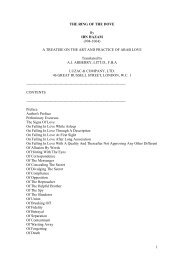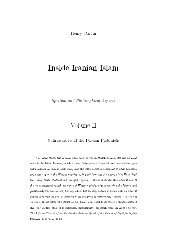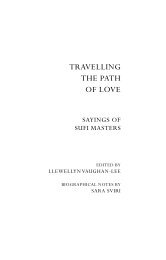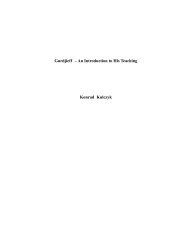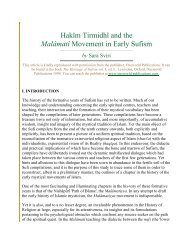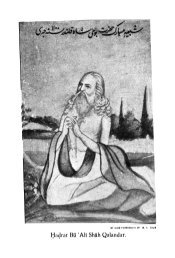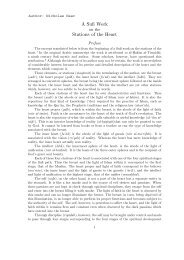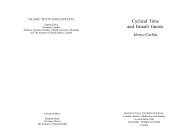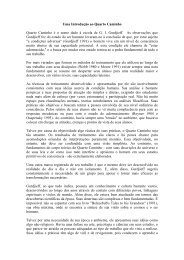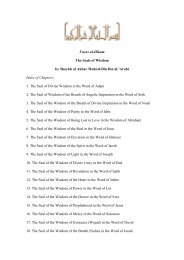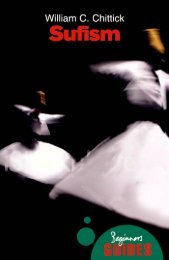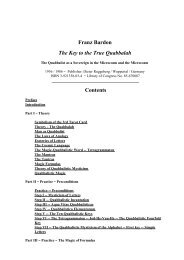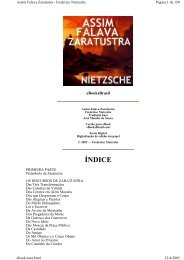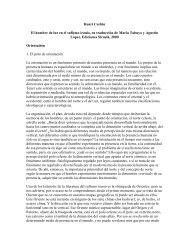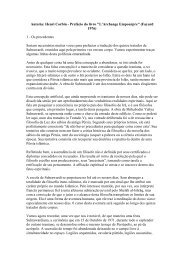Temple and Contemplation brings together for the first ... - ImagoMundi
Temple and Contemplation brings together for the first ... - ImagoMundi
Temple and Contemplation brings together for the first ... - ImagoMundi
Create successful ePaper yourself
Turn your PDF publications into a flip-book with our unique Google optimized e-Paper software.
THE IMAGO TEMPLI IN CONFRONTATION<br />
destruction of <strong>the</strong> <strong>Temple</strong> is <strong>the</strong> end of <strong>the</strong> "previous life" <strong>and</strong> of <strong>the</strong><br />
"previous world". 28<br />
The history of humanity begins with <strong>the</strong> exile, which in its turn begins<br />
with <strong>the</strong> destruction of <strong>the</strong> <strong>Temple</strong>. There is a striking recital dealing with<br />
<strong>the</strong> descent of <strong>the</strong> Neshamah 29 (man's celestial soul, one of <strong>the</strong> souls that<br />
dwells with God, <strong>the</strong> idea of which is extremely close to <strong>the</strong> Zoroastrian<br />
idea of <strong>the</strong> Fravarti/Foruhar). This soul is asked to animate a human being<br />
whose embryo is in <strong>the</strong> process of growing. The soul is aware of all it will<br />
have to give up in order to "descend" to earth, but only through its<br />
descent will <strong>the</strong> human being be marked with <strong>the</strong> divine seal <strong>and</strong> bear<br />
within him <strong>the</strong> Imago Dei. For this reason, <strong>the</strong> soul too traverses <strong>the</strong> same<br />
road as God until <strong>the</strong> return from exile. The Shekhinah in exile is "<strong>the</strong><br />
totality of all <strong>the</strong> suffering of all time <strong>and</strong> of <strong>the</strong> suffering of all creatures in<br />
all <strong>the</strong> worlds". As long as Creation endures <strong>the</strong>re will be exile, up till <strong>the</strong><br />
time when <strong>the</strong> last Neshamah has descended into this world. The Angel<br />
who accompanies <strong>the</strong> Neshamah during its descent reveals to it that it will<br />
find him again at <strong>the</strong> end of its passing through <strong>the</strong> world of exile, that he<br />
will be <strong>the</strong>re to take it back "home". He tells it that all it learned of <strong>the</strong><br />
meaning of Creation in its existence "be<strong>for</strong>e this world" will be plunged<br />
into oblivion, like a temple destroyed. Its garment of light will become a<br />
garment conditioned by <strong>the</strong> <strong>for</strong>m of time. Yet in its exile <strong>the</strong> Neshamah will<br />
be in unison with <strong>the</strong> exile of <strong>the</strong> Shekhinah. Imitating <strong>the</strong> gesture of <strong>the</strong><br />
priests on <strong>the</strong> roof of <strong>the</strong> <strong>Temple</strong> of Solomon when it was being devoured<br />
by flames, <strong>the</strong> Angel throws <strong>the</strong> keys of <strong>the</strong> <strong>Temple</strong> back into <strong>the</strong> heavens.<br />
To know <strong>the</strong>se things is eo ipso to avoid confusing <strong>the</strong> apparent history of<br />
humanity with <strong>the</strong> history conveyed to us in <strong>the</strong> divine Logos, <strong>the</strong> Word of<br />
<strong>the</strong> prophets; <strong>for</strong> <strong>the</strong> latter history is played out on ano<strong>the</strong>r plane <strong>and</strong><br />
cannot be measured with <strong>the</strong> yardstick of our world <strong>and</strong> our life. Our<br />
measures are valid only <strong>for</strong> <strong>the</strong> world of exile, because <strong>the</strong>y are provided<br />
by <strong>the</strong> very <strong>for</strong>m of <strong>the</strong> exile. By means of <strong>the</strong> Word—of <strong>the</strong> divine<br />
Logos—sacred history reaches down to us as "on a boat connecting <strong>the</strong><br />
different worlds". In fact, this Word exists in different worlds, in <strong>the</strong><br />
realities belonging to different levels. It also has <strong>the</strong> virtue of conferring<br />
ano<strong>the</strong>r existence on each reality: "The Images produced by <strong>the</strong> Word<br />
(<strong>the</strong> Logos) dwelling in such <strong>and</strong> such a reality are <strong>the</strong> symbols <strong>and</strong><br />
28 Friedrich Weinreb, op. cit., p. 35.<br />
29 Ibid. See <strong>the</strong> admirable pages 20-32 of this book.<br />
278<br />
THE IMAGO TEMPLI IN CONFRONTATION<br />
parables of those Images which exist in ano<strong>the</strong>r reality." The same<br />
applies to <strong>the</strong> Imago Templi. To underst<strong>and</strong> it, as we said at <strong>the</strong> beginning,<br />
is to reach "<strong>the</strong> meeting-place of <strong>the</strong> two seas".<br />
Who will reach it? The reply to this question is given in an equally<br />
striking hermeneutic relating to <strong>the</strong> saving of Moses from <strong>the</strong> waters; <strong>for</strong><br />
one of <strong>the</strong> symbolic properties of Water is to typify <strong>the</strong> sense of time <strong>and</strong> of<br />
engulfment in time. Pharoah's aim is to make all male children who sink<br />
into time succumb to <strong>the</strong> indifferent uni<strong>for</strong>mity of all that is encased in<br />
time, <strong>and</strong> to prevent <strong>the</strong>m from rising to <strong>the</strong> height of <strong>the</strong> worlds revealed<br />
by <strong>the</strong> divine Word. They are to drown in <strong>the</strong> waters of secular, onedimensional<br />
history. The little "ark" in which, according to esoteric<br />
tradition, his "celestial parents" saved Moses, was in fact <strong>the</strong> divine<br />
Word, <strong>and</strong> Moses was preserved from <strong>the</strong> flux of historical time. What<br />
Pharoah wanted, on <strong>the</strong> o<strong>the</strong>r h<strong>and</strong>, was that only "normal man" should<br />
survive—<strong>the</strong> man who con<strong>for</strong>ms absolutely to <strong>the</strong> norm of a world which,<br />
above all, does not wish to know that it is in exile. 31<br />
The analyses of <strong>the</strong> sacred, <strong>for</strong> which we are indebted to <strong>the</strong> sociological<br />
philosophies or philosophical sociologies from <strong>the</strong> nineteenth century to<br />
<strong>the</strong> present day, strike us as being in perfect con<strong>for</strong>mity with <strong>the</strong> intentions<br />
<strong>and</strong> dispensation of Pharoah. Even when <strong>the</strong>y agree in thinking <strong>and</strong><br />
saying that "history is nothing o<strong>the</strong>r than <strong>the</strong> profanation of <strong>the</strong> sacred<br />
|<strong>and</strong> that] it is <strong>the</strong>re<strong>for</strong>e <strong>the</strong> decadence <strong>and</strong> decomposition of a previously<br />
given reality", 32 it is no less <strong>the</strong> case that <strong>the</strong> content <strong>the</strong>y attribute to <strong>the</strong><br />
notion of <strong>the</strong> sacred is of an alarming poverty, because it is reduced to<br />
purely <strong>for</strong>mal aspects. This is because <strong>the</strong>se analyses have <strong>the</strong>mselves<br />
taken on <strong>the</strong> <strong>for</strong>m of <strong>the</strong> world of exile to such an extent that <strong>the</strong>y can no<br />
longer even be aware or perceive that it is a world of exile. And yet <strong>the</strong><br />
majority of our contemporaries live according to ideologies spawned by<br />
<strong>the</strong>se analyses. At this point <strong>the</strong>re is a preliminary question to be asked. If<br />
History is nothing o<strong>the</strong>r than <strong>the</strong> profanation of <strong>the</strong> sacred, in <strong>the</strong> sense<br />
that <strong>the</strong> profane, which used to be mute, has now itself taken possession of<br />
<strong>the</strong> Word, how is it possible to speak of <strong>the</strong> sacred using a Word which is<br />
itself desacralized, a Word which, in its very nature, profanes <strong>and</strong> is<br />
29 Ibid., pp. 35-36.<br />
31 Cf. Friedrich Weinreb, Die jiidischen Wurzeln des Matthaus Evangelium (Zurich, Origo-<br />
Verlag, 1972), pp. 40—41.<br />
32 Cf. J.F. Marquet, 'Sacre et profanation', in Bulletin de la Societe ligerienne de<br />
philosophie', (1973), pp- 54 ff.<br />
279



